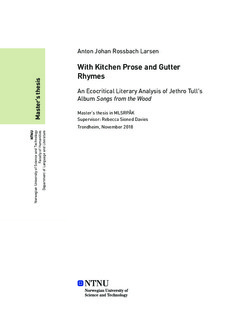| dc.contributor.advisor | Davies, Rebecca Sioned | |
| dc.contributor.author | Larsen, Anton Johan Rossbach | |
| dc.date.accessioned | 2019-05-24T14:00:52Z | |
| dc.date.available | 2019-05-24T14:00:52Z | |
| dc.date.issued | 2018 | |
| dc.identifier.uri | http://hdl.handle.net/11250/2598728 | |
| dc.description.abstract | Denne avhandlingen gir en litterær analyse av hvordan Jethro Tulls album Songs from the Wood fra 1977 behandler miljømessige og økokritiske tema. Det er klart at Songs from the Wood møter Lawrence Buells kriterier for å konstatere om et verk er miljømessig orientert, og analysen er deretter basert på Roman Bartosch og Greg Gerrards syn at økokritikkens bidrag er iboende og verdifullt gradvis. Gjennom en holistisk framgangsmåte basert på en kombinasjon av nærlesing og ”nærhøring” erkjenner analysen sangers unike hybride natur som består av både tekst og musikk.
Analysen konkluderer med at albumet generer positivitet til naturen og får lytteren til å stoppe opp og reflektere rundt implikasjonene av menneskets rolle i miljøendringer. Dette oppnås stort sett gjennom at albumet feirer naturen, hvilket gir lytteren positive assosiasjoner til naturen generelt og skogen spesielt. Denne feiringen er både direkte med tanke på feiring av naturen i seg selv, og indirekte ved å feire hedenske ritualer og kultur, som er assosiert med en livsstil som ligger nærmere naturen. Albumet inneholder også subtile kritiske undertoner, både i henseende til sosialt hierarki og uventede konsekvenser av menneskets involvering i industriell forandring. Hver sang behandler miljømessige tema forskjellig. Første halvdel av albumet fokuserer eksplisitt på naturen sammen med hedensk kultur og ritualer, mens andre halvdel setter miljøtemaene i sammenheng med kjærlighet av forskjellige slag, inkludert både fysisk og følelsesmessig. | |
| dc.description.abstract | This thesis provides a literary analysis of how Jethro Tull’s 1977 album Songs from the Wood deals with environmental and ecocritical themes. It is clear that Songs from the Wood meets Lawrence Buell’s criteria for establishing whether a work is environmentally oriented, and the analysis is subsequently based on Roman Bartosch and Greg Garrard’s view that ecocriticism’s contribution to literature studies is inherently and valuably gradual. Adopting a holistic approach based on a combination of slow reading and “slow listening”, the analysis acknowledges the songs’ unique hybrid nature of lyrics and music.
The analysis concludes that the album instils the listener with positivity towards nature, and makes the listener stop to consider the implications of human involvement in environmental changes. This is largely achieved by the album celebrating nature, instilling the listener with positive associations towards nature in general, and the wood in particular. This celebration is both direct in terms of celebrating nature itself, and indirect in celebrating pagan culture and rituals, associated with a lifestyle closer to nature. The album also features subtle critical undertones, both in regards to social hierarchy and unexpected consequence of human involvement in industrial change. Each song entreats environmental themes differently, the first half of the album focusing on nature quite explicitly alongside paganism, whereas the second half of the album couples the environmental themes with different variations of love, including both physical and emotional expressions of love. | |
| dc.language | eng | |
| dc.publisher | NTNU | |
| dc.title | With Kitchen Prose and Gutter Rhymes - An Ecocritical Analysis of Jethro Tull's Album Songs from the Wood | |
| dc.type | Master thesis | |
